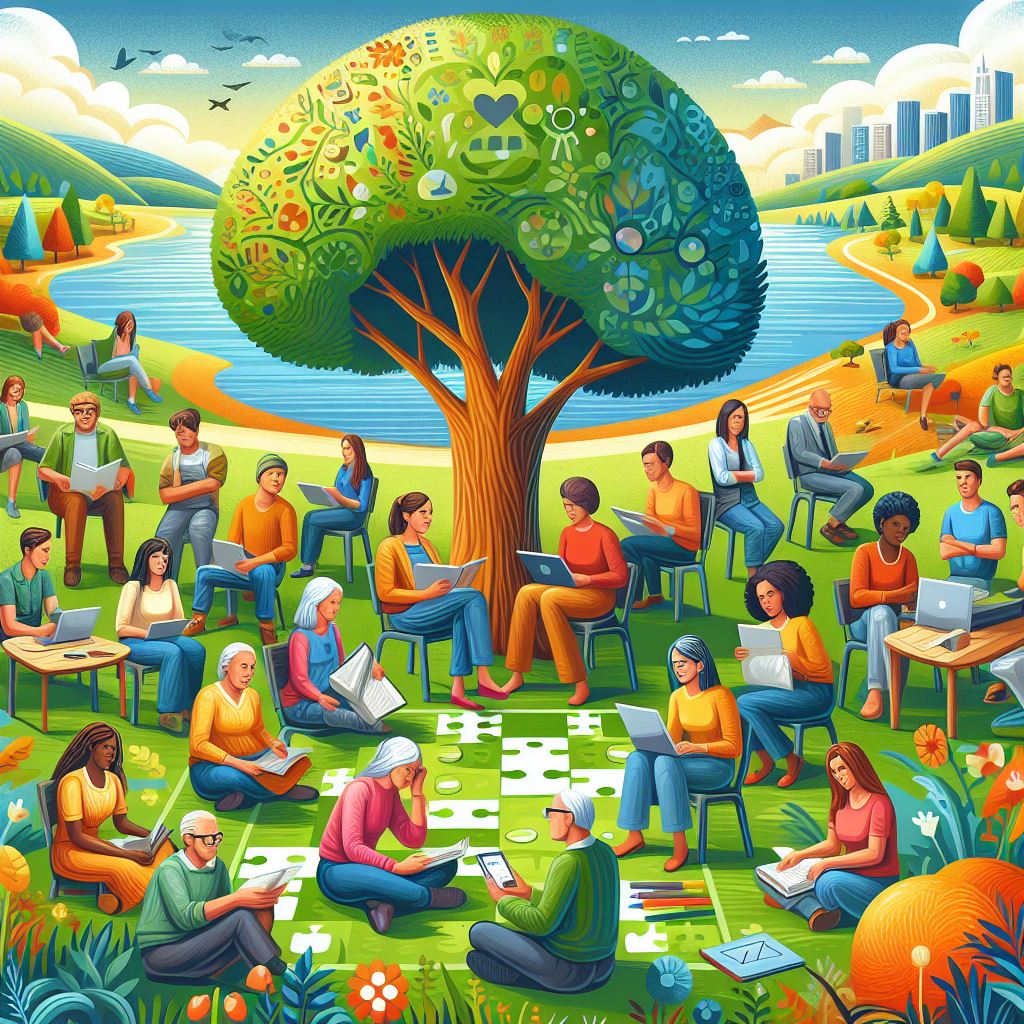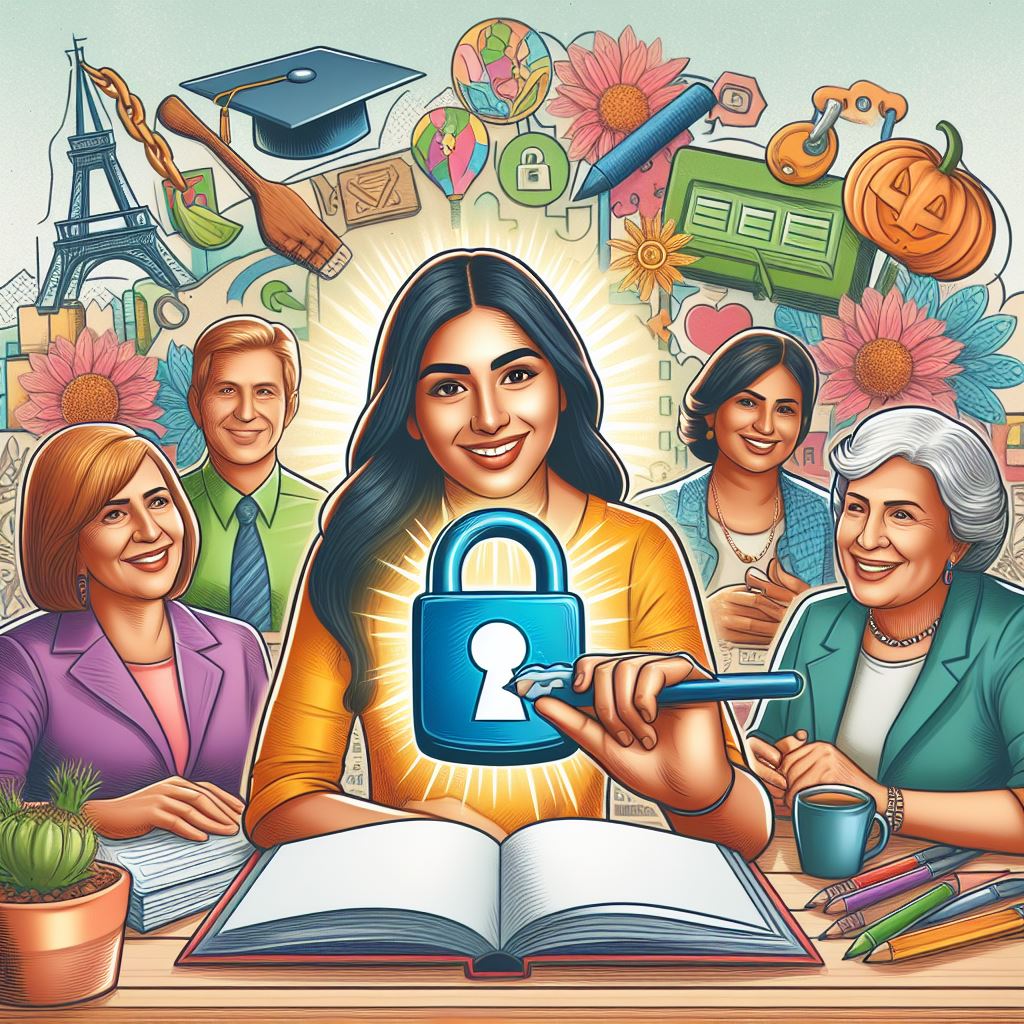Adult Education: Empowering Your Future – Invest in Yourself Today. Is college not for you? Explore the world of Adult Education & unlock a brighter future! Learn new skills, change careers, or finally get your GED. Affordable, accessible, life-changing.
Unleash Your Potential: How Adult Education Can Change Your Life
Have you ever felt a pang of regret about an uncompleted education, a missed opportunity to chase a dream career, or simply a yearning to learn something new?

Maybe you juggled family and work in your younger years, putting your own goals on hold. Perhaps the traditional college route didn’t quite fit your needs. Or maybe, like countless others, you’re facing a rapidly changing job market that demands new skills to stay ahead.
The good news is, it’s never too late to unlock your potential and rewrite your future. Enter the empowering world of Adult Education (AE)! Far from the dusty image of night school, AE offers a vibrant and diverse landscape of opportunities designed to fit your busy life and specific goals.
From acquiring a foundational education to mastering in-demand job skills, from pursuing a lifelong passion to simply learning a new language, AE has something for everyone. Morning, afternoon, evening, and even online classes cater to your schedule, making education truly accessible.
And the best part? The impact of AE goes far beyond textbooks and tests. It’s about empowering yourself, boosting your confidence, and paving the way for a brighter future, both personally and professionally.
So, whether you’re a seasoned professional seeking career advancement, a stay-at-home parent looking to re-enter the workforce, or simply someone with a curious mind, keep reading! This article will be your guide to navigating the exciting world of Adult Education and show you how it can transform your life.
The History of Adult Education: From Ancient Roots to Modern Transformation
Adult education, the empowering process of learning and skill development throughout adulthood, boasts a rich and fascinating history. Its journey stretches far beyond the confines of classrooms, weaving through the very fabric of societies across time.
This section delves into the remarkable evolution of AE, exploring its ancient roots, groundbreaking advancements, and the inspiring individuals who championed its cause.

Early Beginnings:
The seeds of adult education were sown long before the advent of formal schooling. In the cradle of civilization, ancient societies like Egypt and Greece fostered knowledge transmission through practical applications.
Apprenticeship systems flourished in Egypt, where young people learned valuable skills like masonry and carpentry by working alongside experienced craftspeople. These apprenticeships not only ensured the continuation of vital trades but also fostered a sense of community and mentorship.
Meanwhile, in ancient Greece, renowned centers of learning like Plato’s Academy and Aristotle’s Lyceum attracted students of all ages eager to grapple with philosophy, mathematics, and other intellectual pursuits.
While these institutions catered primarily to a privileged class, they nonetheless laid the foundation for the concept of lifelong learning and intellectual discourse.
The Rise of Guilds and the Role of Religion:
The Middle Ages witnessed the rise of guilds, associations of skilled artisans who safeguarded and transmitted their crafts through a structured system.
Blacksmiths, weavers, and stonemasons, for example, meticulously trained apprentices in the intricacies of their trades, ensuring the preservation of valuable knowledge and high-quality workmanship across generations. These guilds functioned as both social and educational institutions, fostering a strong sense of professional identity and community among their members.
Alongside the guilds, religious institutions played a significant role in adult education during this period. Monasteries served as repositories of knowledge, housing vast libraries and offering opportunities for learning to monks and sometimes even lay people.
Scribes meticulously copied and preserved ancient texts, ensuring the continuity of knowledge across centuries. Additionally, the spread of Christianity throughout Europe necessitated the education of adults in basic literacy skills so they could understand religious texts.
The Enlightenment and the Fight for Universal Education:
The Age of Enlightenment, with its emphasis on reason, logic, and individual rights, sparked a renewed interest in education for all.
Thinkers like John Locke challenged the traditional class-based education system, arguing for the importance of universal literacy and education as the foundation for a just and informed citizenry. The rise of literacy movements further fueled this desire for widespread education, leading to the establishment of schools and programs specifically designed for adults.
The Industrial Revolution of the 18th and 19th centuries ushered in a new era of technological advancements and a rapidly changing workforce.
The demand for skilled labor soared, creating a critical need for vocational training programs for adults.
Community-based initiatives flourished, offering evening classes in areas like mechanics, bookkeeping, and basic literacy. These programs not only empowered individuals to secure better jobs but also fostered a sense of social mobility and progress.
The Diverse Landscape of Adult Education Today
The landscape of Adult Education (AE) today is a vibrant tapestry woven from a multitude of programs and opportunities. Gone are the days of one-size-fits-all night school classes.
Modern AE caters to the diverse needs and aspirations of adult learners, offering flexible schedules, targeted skill development, and a chance to explore lifelong passions. Let’s delve into the exciting array of programs available:

Types of Adult Education Programs:
- Academic Programs (GED, High School Equivalency):
For many adults, obtaining a high school diploma or its equivalent remains a critical first step towards a brighter future. AE programs bridge this gap by providing comprehensive instruction in core subjects like reading, writing, math, science, and social studies. The curriculum aligns with the requirements of the General Educational Development (GED) test, a nationally recognized credential that signifies high school equivalency.
These programs cater to learners with varying academic backgrounds, offering individualized support and a supportive learning environment.
Many programs even provide flexible scheduling options, including evening and weekend classes, to accommodate busy adult lives.
Earning a GED opens doors to college opportunities, job training programs, and higher-paying employment. Resources like https://www.ged.com/ offer valuable information and practice materials for those pursuing their GED.
- Vocational Training & Job Training:
The ever-evolving job market demands a skilled and adaptable workforce. Adult Education steps up to the challenge by offering targeted vocational training and job training programs. These programs provide learners with the specific skills and knowledge needed to thrive in high-demand fields.
Whether you’re interested in becoming a certified medical assistant, a computer programmer, or a skilled construction worker, AE programs offer focused instruction and practical experience to get you job-ready.
Many programs even partner with local businesses to provide internship opportunities, allowing you to gain real-world experience and build valuable connections. Additionally, some programs lead to industry certifications that demonstrate your expertise and enhance your resume, making you a more competitive candidate in the job market.
Getting Started with Adult Education: Take Your First Step Towards a Brighter Future
Now that you’ve explored the rich history and diverse offerings of Adult Education (AE), it’s time to translate that knowledge into action! Embarking on your AE journey can be both exciting and overwhelming. This section will equip you with the essential tools and resources to navigate the process with confidence.

Finding Adult Education Programs:
The beauty of AE lies in its accessibility. A wealth of programs are available across various settings, making it easy to find one that fits your location, schedule, and learning style. Here are some key places to start your search:
- Local Community Colleges: Most community colleges offer a robust selection of AE programs, encompassing academic preparation, vocational training, and personal enrichment courses. They often cater to evening and weekend learners and provide valuable resources like academic advising and career counseling.
- Adult Schools: Many public school districts operate adult schools dedicated to serving the educational needs of adult learners. These schools offer a variety of programs, including GED prep, English as a Second Language (ESL) classes, and career training workshops.
- Online Platforms: The digital age has ushered in a new era of online learning opportunities. Reputable online platforms like Coursera, edX, and Udemy offer a vast array of AE courses in various fields. These online courses provide flexibility and cater to learners who prefer a self-paced learning environment.
Don’t hesitate to reach out to local organizations dedicated to adult education advocacy. Organizations like The California Council For Adult Education (CCAE) and The Coalition On Adult Basic Education (COABE) can be a valuable resource for connecting you with programs in your area and providing additional support.
Financial Aid and Scholarships:
The affordability of AE is one of its most attractive features. Many programs offer free or low-cost tuition, making education accessible to a wider range of learners. Additionally, financial aid and scholarship opportunities are often available to help offset the costs of tuition, books, and other educational expenses.
Financial aid options can vary depending on your program, location, and income level. It’s crucial to research and explore the financial aid options offered by your chosen program or institution.
Additionally, consider contacting your local adult education center or community college to inquire about scholarship opportunities specific to your situation. Remember, investing in your education is an investment in your future, and there are resources available to help make it a reality.
Invest in Yourself: Unlock Your Potential with Adult Education
Adult Education (AE) is more than just classrooms and textbooks; it’s a transformative journey of self-discovery and empowerment.
As we’ve explored, its roots stretch back to the dawn of civilization, where knowledge was passed down through apprenticeships and philosophical discourse. The rise of formal programs in the late 19th and early 20th centuries, spearheaded by individuals like Delia L. Griffin, further solidified AE’s place as a crucial social equalizer.

Today, the landscape of AE pulsates with diversity. From acquiring a foundational education through GED programs to mastering in-demand job skills in vocational training, there’s something for everyone.
Whether you yearn to paint the canvas of your life with a new creative pursuit or simply want to learn a new language and connect with others, AE offers a pathway to personal growth and fulfillment.
The best part?
AE is accessible and affordable. Local community colleges, adult schools, and online platforms offer a wealth of programs with flexible schedules to accommodate busy lives. Financial aid and scholarships are also available to help offset costs, making education a reality for all.
So, what are you waiting for? Take the first step towards a brighter future. Explore the resources mentioned in this article, reach out to your local AE providers, and discover the program that ignites your passion.
Remember, it’s never too late to learn, grow, and rewrite your story.
Adult Education is the key; unlock your potential and watch your dreams take flight!
People Also Ask

Q: Is adult education free?
A: Many adult education programs are free or low-cost, making them accessible to a wide range of learners. However, some programs, particularly those offered by online platforms, may have tuition fees. It’s important to research the specific program you’re interested in to understand the associated costs.
Q: What are the benefits of adult education vs college?
A: Adult education offers several advantages compared to traditional college degrees. Here are some key points:
- Faster turnaround time: AE programs are often shorter and more focused than college degrees, allowing you to gain the skills you need more quickly and enter the workforce sooner.
- Affordability: As mentioned above, AE programs are generally more affordable than college degrees, with many free or low-cost options available.
- Targeted skill sets: AE programs are designed to provide specific skills relevant to high-demand fields, making you a more competitive job candidate.
- Flexibility: AE programs often cater to busy adult lives by offering evening, weekend, and online learning options.
Q: Is adult education right for me?
A: Adult education is a great option for anyone looking to learn new skills, advance their career, or simply pursue a personal interest. Here are some factors to consider:
- Your goals: What do you hope to achieve through adult education? Are you looking for a career change, a promotion, or simply personal enrichment?
- Your learning style: Do you prefer a traditional classroom setting, online learning, or a combination of both?
- Your schedule: How much time can you realistically dedicate to your studies? Many AE programs offer flexible scheduling options to accommodate busy lives.
If you’re unsure whether AE is right for you, reach out to your local adult education center or community college. They can help you assess your needs and recommend programs that align with your goals and lifestyle.
Leave comments and questions in the comments section below. I will promptly reply


KBob. This is an excellent idea for your site. With longevity extending, it’s essential that people feel they are achieving and doing something useful as they age and move beyond traditional work. This is an excellent resource for anyone, but especially people who never had a chance to get all the education they wanted. It’s SO available for anyone today!
I’m a teacher and promoter of lifelong learning, which first started in the UK with William Morris, a wonderful artist and philanthropist. Now we have the Internet, so joining a course online is comparatively easy. This helps those with mobility problems and other impairments.
This is a very thoroughly researched article KBob with inspiring visuals. It’s highly readable and memorable.
Keep up the good work championing education!!
Linden
Hi Linden, welcome back. Thanks again for your comments as well as the accolades. I’m glad you like the article. Yes, education is available to just about anyone who wants it.
Leave comments and questions here anytime. I will promptly reply.
KBob